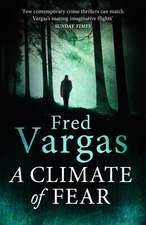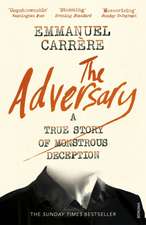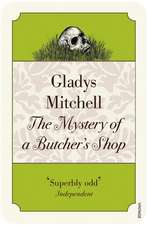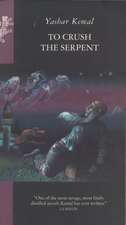When the Devil Holds the Candle: Inspector Sejer Mysteries
Autor Karin Fossum Traducere de Felicity Daviden Limba Engleză Paperback – 3 iun 2007
When
two
teenagers
steal
a
purse
from
a
stroller,
it
results
in
an
infant’s
death.
Unaware
of
the
enormity
of
their
crime,
Zipp
and
Andreas
are
intent
on
committing
another.
They
follow
an
elderly
woman
home,
and
Andreas
enters
her
house
with
his
switchblade.
In
the
dark,
Zipp
waits
for
his
friend
to
come
out.
Inspector Konrad Sejer and his colleague Jacob Skarre see no connection between the infant’s death and the reported disappearance of a local delinquent. And so while the confusion outside mounts, the heart-stopping truth unfolds inside the old woman’s home.
Unflappable as ever, Sejer digs below the surface of small- town tranquility in an effort to understand how and why violence destroys everyday lives.
Inspector Konrad Sejer and his colleague Jacob Skarre see no connection between the infant’s death and the reported disappearance of a local delinquent. And so while the confusion outside mounts, the heart-stopping truth unfolds inside the old woman’s home.
Unflappable as ever, Sejer digs below the surface of small- town tranquility in an effort to understand how and why violence destroys everyday lives.
| Toate formatele și edițiile | Preț | Express |
|---|---|---|
| Paperback (2) | 54.12 lei 24-30 zile | +20.69 lei 5-11 zile |
| Vintage Publishing – 7 noi 2013 | 54.12 lei 24-30 zile | +20.69 lei 5-11 zile |
| HMH Books – 3 iun 2007 | 97.28 lei 6-8 săpt. |
Preț: 97.28 lei
Nou
Puncte Express: 146
Preț estimativ în valută:
18.61€ • 19.48$ • 15.49£
18.61€ • 19.48$ • 15.49£
Carte tipărită la comandă
Livrare economică 31 martie-14 aprilie
Preluare comenzi: 021 569.72.76
Specificații
ISBN-13: 9780156032124
ISBN-10: 0156032120
Pagini: 288
Dimensiuni: 135 x 203 x 20 mm
Greutate: 0.25 kg
Ediția:First Edition
Editura: HMH Books
Colecția Mariner Books
Seria Inspector Sejer Mysteries
Locul publicării:United States
ISBN-10: 0156032120
Pagini: 288
Dimensiuni: 135 x 203 x 20 mm
Greutate: 0.25 kg
Ediția:First Edition
Editura: HMH Books
Colecția Mariner Books
Seria Inspector Sejer Mysteries
Locul publicării:United States
Recenzii
PRAISE
FOR
WHEN
THE
DEVIL
HOLDS
THE
CANDLE
"Either somebody just slid an ice cube down your back or you’re reading the opening pages of When the Devil Holds the Candle, a psychological tour de force."—O, THE OPRAH MAGAZINE
"The story is so chillingly told that we can only marvel at the author’s skill at illustrating how a random sequence of events can cause so many lives to intersect in so many horrifying ways."—THE NEW YORK TIMES BOOK REVIEW
"Either somebody just slid an ice cube down your back or you’re reading the opening pages of When the Devil Holds the Candle, a psychological tour de force."—O, THE OPRAH MAGAZINE
"The story is so chillingly told that we can only marvel at the author’s skill at illustrating how a random sequence of events can cause so many lives to intersect in so many horrifying ways."—THE NEW YORK TIMES BOOK REVIEW
"[I]t
is
an
impossible
book
to
put
down,
a
psychological
thriller
that
will
haunt
you
long
after
the
final
page
has
been
turned."
"A
stunning
exploration
of
social
isolation...
Masterfully
plotted."
"Fossum
.
.
.
writes
like
Ruth
Rendell
with
the
gloves
off."
"This
is
not
your
usual
police
procedural
--
Fossum's
third
Sejer
novel
...
is
psyhcological
suspense
at
its
best."
"[T]he
story
is
so
chillingly
told
that
we
can
only
marvel
at
the
author's
skill
at
illustrating
how
a
random
sequence
of
events
can
cause
so
many
lives
to
intersect
in
so
many
horrifying
ways."
"Either
somebody
just
slid
an
ice
cube
down
your
back
or
you're
reading
the
opening
pages
of
When
the
Devil
Holds
the
Candle...a
psychological
tour
de
force."
"Skillful
characterization
and
revealing
detail
lift
Fossum's
third
mystery
to
be
published
in
the
U.S
featuring
thoughtful
and
intelligent
Insp.
Konrad
Sejer."
Extras
Chapter
1
The courthouse. September 4, 4 p.m.
Jacob Skarre glanced at his watch. His shift was over. He slipped a book out of his jacket pocket and read the poem on the first page. It’s like virtual reality, he thought. Poof!—and you’re in a completely different landscape. The door to the corridor stood open, and suddenly he was aware that someone was watching him, someone just beyond the range of his excellent peripheral vision. A vibration, light as a feather, barely perceptible, finally reached him. He closed the book.
“Can I help you?”
The woman didn’t move, just stood there staring at him with an odd expression. Skarre looked at her tense face and thought she seemed familiar. She was no longer young, maybe about sixty, and wore a coat and dark boots. There was a scarf around her neck, just visible; he could see it above her collar. Its pattern offered a sharp contrast to what she most likely possessed in the way of speed and elegance: racehorses with jockeys in colorful silks against a dark blue background. She had a wide, heavy face, elongated by a prominent chin. Her eyebrows were dark and had grown almost together. She was clutching a handbag against her stomach. Most noticeable of all was her gaze. Her eyes were blazing in that pale face. They fixed him with a tremendous force. Then he remembered who she reminded him of. What an odd coincidence, he thought, as he waited for her to speak. He sat there as if riveted by the silence. Any minute now, she was going to say something momentous.
“It has to do with a missing person,” she said.
Her voice was rough. A rusty tool creaking into motion after long idleness. Behind her white forehead burned a fire. Skarre could see it flickering in her irises. He was trying not to make assumptions, but obviously she was possessed. Gradually it dawned on him what sort of person he was dealing with. In his mind he rehearsed the day’s reports, but he could not recall whether any patients had been listed as missing from the psychiatric institutes in the district. She was breathing heavily, as if it had cost her considerable effort to come here. But she had made up her mind, driven by something. Skarre wondered how she had got past the reception area and Mrs. Brenningen’s eagle eye.
“Who is missing?” he asked in a friendly voice.
She kept staring at him. He met her gaze with the same force, curious to see if she would flinch. Her expression turned to one of confusion.
“I know where he is.”
Skarre was startled. “You know where he is? So he’s not missing?”
“He probably won’t live much longer,” she said. Her thin lips began to quiver.
“Whom are we talking about?” Skarre said. He hazarded a guess: “Do you mean your husband?”
“Yes. My husband.”
She nodded resolutely, stood there, straight-backed and unmoving, her handbag still pressed to her stomach. Skarre leaned back in his chair.
“Your husband is sick, and you’re worried about him. Is he old?”
It was an inappropriate question. Life is life, as long as a person is alive and means something, maybe everything, to another human being. He immediately regretted having asked, picked up his pen from the desk, and began twirling it between his fingers.
“He’s like a child,” she said sadly.
He was surprised at her response. What was she talking about? The man was sick, possibly dying. And senile, it occurred to him. Regressing to his childhood. At the same time Skarre had a strange feeling that she was trying to tell him something else. Her coat was threadbare at the lapels, and the middle button had been sewn on rather badly, creating a fold in the fabric.Why am I noticing these things?he wondered.
“Do you live far from here?” He glanced at his watch. Perhaps she could afford a taxi.
She squared her shoulders. “Prins Oscars Gate 17.” She enunciated the street name with crisp consonants. “I didn’t mean to bother you,” she said.
Skarre stood up. “Do you need help getting home?”
She was still staring into his eyes. As if there were something she wanted to take away with her. A glow, a memory of something very much alive. Skarre had a weird sensation, the sort of thing that happens only rarely, when the body reacts instinctively. He lowered his gaze and saw that the short blond hairs on his arms were standing on end. At the same moment, the woman turned around and walked slowly to the door. She took short, awkward steps, as if she were trying to hide something. He went back to his chair. It was 4:03 p.m. For his own amusement, he scribbled a few notes on his pad.
“A woman of about sixty arrives at the office at 4 p.m. She seems confused. Says her husband is missing, that he doesn’t have long to live. Wearing a brown coat with a blue scarf at her neck. Brown handbag, black boots. Possibly mentally ill. Left after a few minutes. Refused offer of help to get home.”
He sat there, turning her visit over in his mind. She was probably just a lost soul; there were so many of them nowadays. After a while he folded the piece of paper and stuck it into his shirt pocket. The incident didn’t belong in his daily report.
Has anyone seen andreas? That was the headline in the town’s largest newspaper, set in bold type. That’s the way newspapers express themselves, using an informal tone to address us directly, as if we were on a first-name basis and have known each other a long time. We’re supposed to break down the barriers of formality and use a straightforward, youthful tone in this fresh, onward-storming society. So even though very few people actually knew him or used his first name, let’s just cut right to the chase and ask: Has anyone seen Andreas?
And the picture of him. A nice-looking boy of eighteen, with a thin face and unruly hair. I say “nice-looking”; I’m generous enough to admit that. So handsome that things came easily to him. He strutted around with that handsome face and took things for granted. It’s a familiar pattern, but it does no one any good to look like that. Handsome in a timeless, classic way. A charming boy. It costs me a bit to use that word, but all the same . . . charming.
On the afternoon of September 1, he left his house on Cappelens Gate. He said nothing about where he was off to. Where are you going? Out. That’s the kind of answer you give at that age. A sort of infinite guardedness. You think you’re so exceptional. And his mother didn’t have the sense to press him. Maybe she used his obstinacy as fuel for her martyrdom. Her son was growing away from her, and she hated it. But it’s really a matter of respect. She should have taught the boy always to reply in a polite and precise manner. I’m going out, well, with someone. We’re thinking of going into town. I’ll be home before midnight. Surely that’s not too much to ask, is it? But she had failed, as have so many others. That’s what happens when you invest all your energy in yourself, your own life, your own sorrow. I know what I’m talking about. And the sorrow was going to get worse. He never came home.
Yes, I’ve seen Andreas. I can see him whenever I like. A lot of people are going to be surprised when he’s finally found. And of course they’ll speculate, they’ll guess, and write up reports, carry on discussions, and fill numerous files. Everyone with his own theory. And all wrong, of course. People howl with many voices. In the midst of that din I’ve lived in silence for almost sixty years. My name is Irma. Now I’m the one who’s doing the talking. I won’t take much time, and I’m not saying that I have a monopoly on the truth. But what you’re reading now is my version.
Copyright © J. W. Cappelens Forlag, A.S., 1998
English translation copyright © Felicity David, 2004
All rights reserved. No part of this publication may be reproduced
or transmitted in any form or by any means, electronic or mechanical,
including photocopy, recording, or any information storage and
retrieval system, without permission in writing from the publisher.
Requests for permission to make copies of any part of the work
should be submitted online at www.harcourt.com/contact or
mailed to the following address: Permissions Department,
Harcourt, Inc., 6277 Sea Harbor Drive, Orlando, Florida 32887-6777.
The courthouse. September 4, 4 p.m.
Jacob Skarre glanced at his watch. His shift was over. He slipped a book out of his jacket pocket and read the poem on the first page. It’s like virtual reality, he thought. Poof!—and you’re in a completely different landscape. The door to the corridor stood open, and suddenly he was aware that someone was watching him, someone just beyond the range of his excellent peripheral vision. A vibration, light as a feather, barely perceptible, finally reached him. He closed the book.
“Can I help you?”
The woman didn’t move, just stood there staring at him with an odd expression. Skarre looked at her tense face and thought she seemed familiar. She was no longer young, maybe about sixty, and wore a coat and dark boots. There was a scarf around her neck, just visible; he could see it above her collar. Its pattern offered a sharp contrast to what she most likely possessed in the way of speed and elegance: racehorses with jockeys in colorful silks against a dark blue background. She had a wide, heavy face, elongated by a prominent chin. Her eyebrows were dark and had grown almost together. She was clutching a handbag against her stomach. Most noticeable of all was her gaze. Her eyes were blazing in that pale face. They fixed him with a tremendous force. Then he remembered who she reminded him of. What an odd coincidence, he thought, as he waited for her to speak. He sat there as if riveted by the silence. Any minute now, she was going to say something momentous.
“It has to do with a missing person,” she said.
Her voice was rough. A rusty tool creaking into motion after long idleness. Behind her white forehead burned a fire. Skarre could see it flickering in her irises. He was trying not to make assumptions, but obviously she was possessed. Gradually it dawned on him what sort of person he was dealing with. In his mind he rehearsed the day’s reports, but he could not recall whether any patients had been listed as missing from the psychiatric institutes in the district. She was breathing heavily, as if it had cost her considerable effort to come here. But she had made up her mind, driven by something. Skarre wondered how she had got past the reception area and Mrs. Brenningen’s eagle eye.
“Who is missing?” he asked in a friendly voice.
She kept staring at him. He met her gaze with the same force, curious to see if she would flinch. Her expression turned to one of confusion.
“I know where he is.”
Skarre was startled. “You know where he is? So he’s not missing?”
“He probably won’t live much longer,” she said. Her thin lips began to quiver.
“Whom are we talking about?” Skarre said. He hazarded a guess: “Do you mean your husband?”
“Yes. My husband.”
She nodded resolutely, stood there, straight-backed and unmoving, her handbag still pressed to her stomach. Skarre leaned back in his chair.
“Your husband is sick, and you’re worried about him. Is he old?”
It was an inappropriate question. Life is life, as long as a person is alive and means something, maybe everything, to another human being. He immediately regretted having asked, picked up his pen from the desk, and began twirling it between his fingers.
“He’s like a child,” she said sadly.
He was surprised at her response. What was she talking about? The man was sick, possibly dying. And senile, it occurred to him. Regressing to his childhood. At the same time Skarre had a strange feeling that she was trying to tell him something else. Her coat was threadbare at the lapels, and the middle button had been sewn on rather badly, creating a fold in the fabric.Why am I noticing these things?he wondered.
“Do you live far from here?” He glanced at his watch. Perhaps she could afford a taxi.
She squared her shoulders. “Prins Oscars Gate 17.” She enunciated the street name with crisp consonants. “I didn’t mean to bother you,” she said.
Skarre stood up. “Do you need help getting home?”
She was still staring into his eyes. As if there were something she wanted to take away with her. A glow, a memory of something very much alive. Skarre had a weird sensation, the sort of thing that happens only rarely, when the body reacts instinctively. He lowered his gaze and saw that the short blond hairs on his arms were standing on end. At the same moment, the woman turned around and walked slowly to the door. She took short, awkward steps, as if she were trying to hide something. He went back to his chair. It was 4:03 p.m. For his own amusement, he scribbled a few notes on his pad.
“A woman of about sixty arrives at the office at 4 p.m. She seems confused. Says her husband is missing, that he doesn’t have long to live. Wearing a brown coat with a blue scarf at her neck. Brown handbag, black boots. Possibly mentally ill. Left after a few minutes. Refused offer of help to get home.”
He sat there, turning her visit over in his mind. She was probably just a lost soul; there were so many of them nowadays. After a while he folded the piece of paper and stuck it into his shirt pocket. The incident didn’t belong in his daily report.
Has anyone seen andreas? That was the headline in the town’s largest newspaper, set in bold type. That’s the way newspapers express themselves, using an informal tone to address us directly, as if we were on a first-name basis and have known each other a long time. We’re supposed to break down the barriers of formality and use a straightforward, youthful tone in this fresh, onward-storming society. So even though very few people actually knew him or used his first name, let’s just cut right to the chase and ask: Has anyone seen Andreas?
And the picture of him. A nice-looking boy of eighteen, with a thin face and unruly hair. I say “nice-looking”; I’m generous enough to admit that. So handsome that things came easily to him. He strutted around with that handsome face and took things for granted. It’s a familiar pattern, but it does no one any good to look like that. Handsome in a timeless, classic way. A charming boy. It costs me a bit to use that word, but all the same . . . charming.
On the afternoon of September 1, he left his house on Cappelens Gate. He said nothing about where he was off to. Where are you going? Out. That’s the kind of answer you give at that age. A sort of infinite guardedness. You think you’re so exceptional. And his mother didn’t have the sense to press him. Maybe she used his obstinacy as fuel for her martyrdom. Her son was growing away from her, and she hated it. But it’s really a matter of respect. She should have taught the boy always to reply in a polite and precise manner. I’m going out, well, with someone. We’re thinking of going into town. I’ll be home before midnight. Surely that’s not too much to ask, is it? But she had failed, as have so many others. That’s what happens when you invest all your energy in yourself, your own life, your own sorrow. I know what I’m talking about. And the sorrow was going to get worse. He never came home.
Yes, I’ve seen Andreas. I can see him whenever I like. A lot of people are going to be surprised when he’s finally found. And of course they’ll speculate, they’ll guess, and write up reports, carry on discussions, and fill numerous files. Everyone with his own theory. And all wrong, of course. People howl with many voices. In the midst of that din I’ve lived in silence for almost sixty years. My name is Irma. Now I’m the one who’s doing the talking. I won’t take much time, and I’m not saying that I have a monopoly on the truth. But what you’re reading now is my version.
Copyright © J. W. Cappelens Forlag, A.S., 1998
English translation copyright © Felicity David, 2004
All rights reserved. No part of this publication may be reproduced
or transmitted in any form or by any means, electronic or mechanical,
including photocopy, recording, or any information storage and
retrieval system, without permission in writing from the publisher.
Requests for permission to make copies of any part of the work
should be submitted online at www.harcourt.com/contact or
mailed to the following address: Permissions Department,
Harcourt, Inc., 6277 Sea Harbor Drive, Orlando, Florida 32887-6777.
Descriere
Descriere de la o altă ediție sau format:
Andreas's disappearance is a mystery to all, including his inseparable friend Zipp. But as much as the police question him, its not easy for Zipp to come forward with details of the last time he saw his friend: following an old woman into her home, brandishing his knife. Zipp waited anxiously outside but Andreas failed to reappear.
Andreas's disappearance is a mystery to all, including his inseparable friend Zipp. But as much as the police question him, its not easy for Zipp to come forward with details of the last time he saw his friend: following an old woman into her home, brandishing his knife. Zipp waited anxiously outside but Andreas failed to reappear.
























